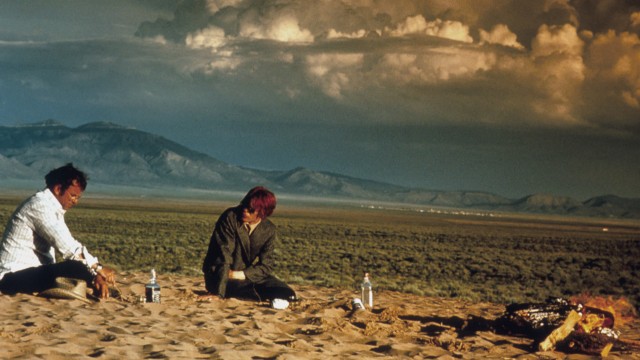Just as the stranded explorer of The Martian is not an alien, the mysterious visitor in The Man Who Fell to Earth (1976) is not human. Both titles, then, indicate what these characters are not—suggesting that these films require a suspension of disbelief. Yet these disclaimers, if you will, have different functions. In The Martian, the premise is a classic SF trope; the audience, it is hoped, will see the movie with an unjaded eye. In contrast, The Man Who Fell to Earth dares its viewers to keep up with its shifting locations, time frames, and sequences where the visitor is nowhere in sight.
Another way of putting it is that The Man Who Fell to Earth is very much a part of the 70s avant garde. Directed by Nicholas Roeg, who had a guiding hand in Performance (1970), the “performance” of David Bowie, who takes the leading role, is derived from Bowie’s spaced-out concept record, The Rise and Fall of Ziggy Stardust and the Spiders from Mars (1972). Thus the film is like a series of extended songs, or riffs, on an alien being confronted with the alienation of U.S. society.
 Sometimes the pieces fit together; sometimes they don’t. The film’s casual, if not downright antagonistic, attitude about explaining the action places us in the time/space-warped psyche of Thomas Jerome Newton, who arrives from a drought-stricken planet. At first, we assume he is on Earth to help his family in some way. Then as he sells patents for futuristic technology, his dreams of returning home are corrupted by his immense wealth and his comfortable life.
Sometimes the pieces fit together; sometimes they don’t. The film’s casual, if not downright antagonistic, attitude about explaining the action places us in the time/space-warped psyche of Thomas Jerome Newton, who arrives from a drought-stricken planet. At first, we assume he is on Earth to help his family in some way. Then as he sells patents for futuristic technology, his dreams of returning home are corrupted by his immense wealth and his comfortable life.
That, however, is a rather major oversimplification. Like the multiple television sets Newton watches all at once, several plotlines unwind. There is the uncanny effect Newton has on those he recruits for his corporation—they all orbit around Newton’s black-hole persona; soon after, they, and Newton, face retaliation by the government for putting the economy at risk. Added to this conspiratorial theme, typical of 70s movies, there is the unlikely romance between Newton and Mary Lou, a hotel maid. There is also the concept of time travel that takes a strange turn: Newton can “see” moments of U.S. history. Furthermore, he never seems to age, as if he is outside of time.
One of the more apocalyptic songs on Ziggy Stardust, “Five Years,” starts with the announcement that “Earth was really dying,” and therefore time is running out for the human species. The protagonist realizes that in this time of crisis, “I never thought I’d need so many people.” And as the music swells, he says, “I felt like an actor,” as if he’s playing the role of witness to the end, as the lyrics repeat, “Five years, that’s all we’ve got.” But the song feels timeless: as if the fantasy of destroying time, preserves it.
Or, more accurately, memories remain of daily life on the planet. There’s a self-consciousness to The Man Who Fell to Earth, for that is what any photographic medium does, record memories. And the record may well exist long after we’re gone.
Memory, though, can play tricks on us. Whose memories are we watching onscreen? Are these memories accurate representations of what really happened? How do we know for certain? We therefore should be careful about taking anything in this film for granted.
With its bumpy, some might say uneven, script, the film would perhaps completely fall apart if it weren’t for Bowie. If any person in the mid-70s could be considered as out of this world it would be him. He became a rock star by questioning, at every turn, the supposed authenticity of a rock ‘n’ roll performer. Bowie knows how to project, with a theatrical precision, the feelings of someone who’s concealing his real identity—or thinks he is.
Hiding out in America (which Bowie, in the mid-70s, did, in real life), Newton encounters a weird mix of desires in the so-called land of opportunity. Take away the hard drugs, and you have a SF take on Hunter S. Thompson’s evisceration of the American dream in his journalistic novel, Fear and Loathing in Las Vegas (1971). Joining Newton on his road to nowhere through the desert landscape of New Mexico are Mary-Lou, who fills the spaces in her life with alcohol and religion, and Dr. Bryce, who is dedicated equally to science and sex, and serves as Newton’s project consultant.
Rip Torn, perfectly cast as Bryce, was, reportedly, considered for a lead part in the archetypal road movie, Easy Rider (1969), until he fought with Dennis Hopper, who directed and acted in the picture. As Bryce, Torn is a formerly rugged icon of American masculinity, now in slow decline.
Candy Clark, who plays Mary Lou, emanates, at times, sheer desperation as she tries to reach out to Newton through various forms of love—motherly, romantic, physical—all falling short in sustaining her initial passion for him. Once immersed in a TV world, Newton has relatively little interest in her.
Newton eventually gets around to trying to return to his home planet, but the space launch is quickly stopped by government agents. Unable to physically reunite with his family, he tries to communicate with them by making a record, and hoping they will hear it when it’s played on the radio. Bowie already had explored this possibility on one of the more emotionally moving songs on Ziggy Stardust, “Starman,” about an alien using radio transmissions to send a message to listeners: “That weren’t no D.J. that was hazy cosmic jive.”
The idea that intergalactic communication intensifies the feeling of isolation is picked up on by The Martian. But that film regards isolation as just another problem to be solved with the help of technology—a nostalgic fantasy about “discovering” new worlds that some, including me, would regard as a falling back on dreams of colonialist adventures (that never worked out too well for those being “discovered”).
It is the impulse of going forward into the past that The Man Who Fell to Earth sharply satirizes. In its laying bare of American mythology, the film is at its most subversive, implicating the viewer in the problematic desire to live in the past to avoid the future. For, as Graham Fuller points out, our fate is more than likely going to resemble what the inhabitants of Newton’s home planet are facing: the threat of extinction due to a massive environmental disaster.
Watching the film now, it feels like we have long been haunted by what technology has already done to diminish our chances for survival. It can’t be too long before we hear arguments, if we haven’t already, for colonizing other worlds to extend the duration of our species.
A year before Ziggy Stardust, Bowie released a song called “Life On Mars” (1971). By then, the hopes for 60s social revolution, which gave rise to the idealistic concept that we were all together on “Spaceship Earth,” had faded. The song’s protagonist looks up at the sky, and wonders, “Is there life on Mars?”
The Martian would answer: Yes—and it doesn’t have to be alien at all.

